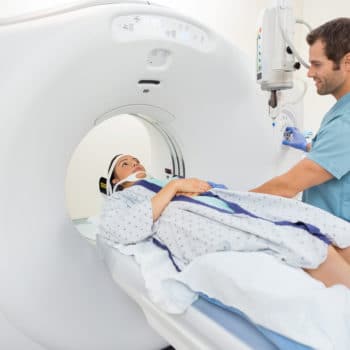Why We Love It
-
$68,340Potential Avg. Salary
-
10.4%Job Growth Rate
-
Growing DemandJob Outlook
-
Dependable Daily WorkloadCareer Attribute
MRI technicians collect images of the brain and body using a magnetic resonance imaging (MRI) scanner. They inject patients with materials, such as gadolinium, that help highlight areas being captured, and tell patients what to expect during the procedure. They then gather the images required for diagnosis.
Recommended Schools
What is a MRI Technician (Tech)?
The following job responsibilities are common for individuals in MRI technician roles:
- Read instructions from physicians detailing what images should be taken on patients
- Prepare and adjust equipment before MRIs are conducted
- Inject patients with gadolinium or another material to help highlight areas of interest
- Provide instructions to patients before procedures, and talk to patients during procedures to request actions or help keep patients calm
- Capture all required images, and provide those images to physicians for diagnosis
A Day in the Life
MRI technicians make a living operating magnetic resonance imaging (MRI) scanners. MRI scanners provide more detailed views of the insides of a patient’s body and are commonly used to diagnose—or eliminate suspicions of—tumors, injuries, or structural deformities. MRI techs receive instructions from ordering physicians that explain what areas of the body to image and what to look for. They then conduct the MRI scans on patients, capturing images and providing those to doctors for diagnosis.
MRI machines are large tubes, and the process of an MRI can take an hour or more. For this reason, it’s important for MRI technicians to explain the process of the procedure to patients in detail before the procedure begins. Once inside of the machine, it’s critical for patients to remain calm and still so the technician can capture good images, so technicians provide plenty of information to patients before the procedure and talk to patients using a microphone during procedures to provide instructions.
In some cases, MRI technicians may need to inject patients with gadolinium or another material to help highlight areas of interest during procedures. Additionally, patients who are claustrophobic or exceptionally nervous about the procedure may need to be mildly sedated before procedures. The MRI tech operates the scanner from a separate room, instructing the patient to do different tasks to monitor brain functions for different activities. The images captured are provided to doctors to use in diagnosis.
Typical Work Schedule
Most MRI technicians work full-time schedules. While the bulk of their work may be conducted during normal business hours, some who work for hospitals may need to work evenings, weekends, or holidays to perform MRIs in emergency situations.
Projected Job Growth
Demand for MRI technicians is expected to grow in the coming decade as the large, aging Baby Boomer generation will increase demand for medical care. As individuals age, they have an increased risk for issues like cancer and Alzheimer’s disease that can be diagnosed using an MRI, so the increased number of seniors in the coming decades is expected to increase demand for qualified MRI techs.
Typical Employers
More than half of all MRI technicians are employed to work for both public and private hospitals. Others may work for diagnostic laboratories, and a small percentage work for private doctor practices.
Recommended Schools
How To Become a MRI Technician (Tech)
The first step in becoming an MRI technician is to earn an associate’s degree in radiologic technology. With an associate’s degree, you’ll qualify to work as a radiologic technologist, performing x-rays on patients. Most MRI technicians begin their careers as radiologic technicians and work in that career for five years or more before moving into MRI technician roles. In addition to an associate’s degree, you’ll likely have to become licensed by your state, which usually requires passing a certification exam.
After working as an x-ray technician for a number of years, you may qualify to move into an MRI technician role. While few states require an additional license to operate MRI scanners, some states do, and some employers require the additional certification even if the state doesn’t demand it. Certification in MRI technology requires passing a test administered by either the American Registry of Radiologic Technologists or the American Registry of Magnetic Resonance Imaging Technologists.
Additional college coursework or on-the-job training will likely be required to prepare for the MRI technician certification exam, but classes can be taken one-off and do not require an additional degree. With professional experience and the right certifications and licenses as dictated by your state and employer, you should be able to find work in the field as an MRI technician.
MRI Technician (Tech) Salary Data
We’ve provided you the following to learn more about this career. The salary and growth data on this page comes from recently published Bureau of Labor Statistics data while the recommendations and editorial content are based on our research.
National Anual Salary
Low Range
$56,160Average
$68,340High Range
$94,550National Hourly Wage
Low Range
$27/hrAverage
$33/hrHigh Range
$45/hrHow do MRI Technician (Tech) salaries stack up to other jobs across the country? Based on the latest jobs data nationwide, MRI Technician (Tech)'s can make an average annual salary of $68,340, or $33 per hour. On the lower end, they can make $56,160 or $27 per hour, perhaps when just starting out or based on the state you live in.
Salary Rankings And Facts
#211 Nationally for All Careers
Above Average Salary Nationally
Programs and Degrees
Here are the most common degrees for becoming a MRI Technician (Tech). a is usually recommended and specifically a degree or coursework that prepares you for the particular field, see below.
Highest Education Among MRI Technician (Tech)s
- 1.8% Doctorate
- 1.9% Masters
- 22% Bachelors
- 44.3% Associates
- 21.8% College
- 7.4% High School
- 0.7% Less than High School
Job Growth Projections and Forecast
2014 Total Jobs
33,6002024 Est. Jobs
37,100Job Growth Rate
10.4%Est. New Jobs
3,500How does MRI Technician (Tech) job growth stack up to other jobs across the country? By 2024, there will be a change of 3,500 jobs for a total of 37,100 people employed in the career nationwide. This is a 10.4% change in growth over the next ten years, giving the career a growth rate nationwide of Above Average.
Growth Rankings And Facts
#177 Nationally for All Careers
Above Avg. Growth Nationally
What Companies Employ The Most MRI Technician (Tech)s
| Industry | Current Jobs | New Jobs Needed | % Increase |
|---|---|---|---|
| General medical and surgical hospitals; private | 16,900 | 300 | 0% |
| Medical and diagnostic laboratories | 6,600 | 1,800 | 2% |
| Offices of physicians | 4,900 | 800 | 1% |













